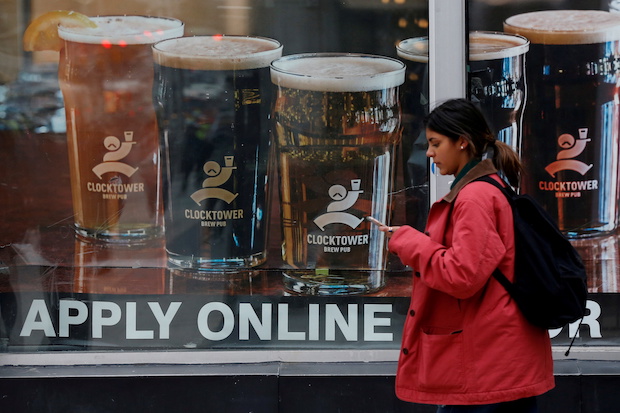
A sign advertising available jobs at the Clocktower Brew Pub hangs in a window in Ottawa, Ontario, Canada, Nov. 9, 2017. (REUTERS)
OTTAWA — Canada’s tight labor market is forcing many companies to offer regular COVID-19 testing over vaccine mandates, while others are reversing previously announced inoculation requirements even as Omicron variant cases rise.
Canadian Prime Minister Justin Trudeau’s government adopted one of the strictest inoculation policies in the world for civil servants and has already put more than 1,000 workers on unpaid leave, with thousands more at risk.
Airlines, police forces, school boards, and even Canada’s Big Five banks have also pledged strict mandatory vaccine policies. But following through has proven less straightforward, especially as employers grapple with staffing shortages and workers demand exemptions.
Job vacancies in Canada have doubled so far this year, official data shows, and vaccine mandates can make filling those jobs harder, potentially putting upward pressure on wages. That could fuel inflation, already running at a near two-decade high.
“It’s already difficult to find staff, let alone putting in a vaccine mandate. You’d cut out potentially another 20%” of potential workers, said Dan Kelly, chief executive of the Canadian Federation of Independent Business.
There are pitfalls to employing the unvaccinated. Companies run a higher risk of COVID-19 outbreaks and many vaccinated employees are uncomfortable working with those who have not had the jab, said industry groups and marketing experts.
At Luda Foods, a Montreal-based soup and sauce maker, president Robert Eiser said he has 14 open jobs, no vaccine mandate, and no plans to restrict new hires to the vaccinated.
“I don’t know that I want to reduce the (labor) pool, which is already quite low,” said Eiser. “We need to attract people to meet the demand. If we don’t, our competitors will.”
Data released on Friday underpinned Canada’s tight labor market, with a hefty 153,700 jobs added in November. It also showed a growing mismatch between available workers and unfilled jobs. And job postings are far above pre-pandemic levels.
Walking back
The province of Quebec backtracked on a vaccine mandate for healthcare workers last month, saying they could not afford to lose thousands of unvaccinated staff. Ontario, which was also eyeing a mandate, said it would not go ahead.
Toronto-Dominion Bank and Bank of Montreal have both softened their vaccine policy to allow regular testing for workers who missed their Oct. 31 inoculation deadline.
In Canada, 86% of adults are fully inoculated, though that drops under 80% among 18-40-year-olds. At least 15 cases of the new Omicron variant in Canada have been reported in the past week.
John Cappelli, vice president of onsite managed services in Canada for global recruitment firm Adecco, said half of his clients are mandating vaccines with the other half allowing regular testing for the unvaccinated.
But he expects the Omicron variant will prompt more workplaces to get strict on vaccination, even as they grapple with the tightest job market he’s seen in his 25-year career.
“We are now starting to see our first workplace (COVID-19) cases in five months,” he said.
The number of Canadian job postings on search website Indeed mentioning vaccine requirements has quadrupled since August.
In the hard-hit manufacturing sector, where 77% of firms say their top concern is attracting and retaining workers, vaccine mandates are rarer.
Dennis Darby, CEO of Canadian Manufacturers and Exporters, said most of Canada’s factories have operated safely throughout the pandemic. While CME encourages vaccination, “some companies are still using rapid testing if somebody doesn’t want to get vaccinated,” he added.
But companies risk a hit to their reputation if they are overt in efforts to tap into the unvaccinated as a labor pool, said Wojtek Dabrowski, managing partner at Provident Communications.
“If you go out and say, ‘We are intentionally seeking to hire unvaccinated people,’ many customers are equating that with you being anti-science and anti-safety,” said Dabrowski.